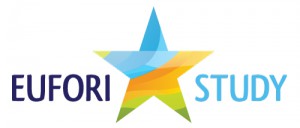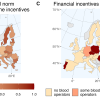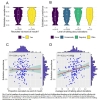Eufori Workshop September 19 2013
On September 19 the VU University hosted a European research conference for the EUFORI research project. The EUFORI study is the study on European Foundations for Research and Innovation. Initiated by the European Commission (within FP7), the study aspires to quantify and assess foundations’ financial support and policies for research and innovation in the EU, make a comparative analysis between EU Member States, and identify trends and the potential for future developments in this sector. 29 European countries participate in this comprehensive and ambitious study. For each country a National Expert is responsible to conduct the research in his/her country. The VU University coordinates the research and provides the National Experts with the necessary guidelines and data.
The workshop held on the 19th is an important element in the research project. The EUFORI project started in 2012. With the study well a year underway, the workshop provided a good opportunity to reflect on the data collection, to discuss the first preliminary results from the data and to discuss future challenges in the research project.
Introduction and plenary session
The day was started by Professor Theo Schuyt, project leader of the EUFORI study, who welcomed the representatives of the European Commission (Ignacio de Puente and Marita Kayamanidou) and the National Experts. Ignacio de Puente (EC) emphasized the importance of the EUFORI study for Europe. There is a need for policy makers in Europe to better understand and empirically demonstrate the contribution that foundations make to the R&I field and to better comprehend the role they play in the current economic and social context.
Yvonne van Rooy, President of the Dutch Association of Hospitals and board member of the GAK foundation, gave a valuable insight in both the recipient and the donor side of R&I contributions. Both receivers and donors have valuable information about foundation practices to share. She emphasized the importance of bridging the gap between donors (such as foundations) and academic research.
After a short coffee break, the first results of the data collection were presented by the VU coordinating team (Barbara Gouwenberg, Barry Hoolwerf and Danique Karamat Ali). First, Barry Hoolwerf discussed the process of data collection. A major challenge was to take into account the large context differences within the 29 countries on the one hand and to standardize the questionnaire on the other hand. Also, he explained several measures taken to increase the response rate.
Danique Karamat Ali discussed the process of data cleaning and quality control that was executed by the VU coordinating team before distributing the (cleaned) data files to the National Experts. She explained the steps that had been taken in order to clean the data and enhance the quality of the data. Finally, Barbara Gouwenberg presented the first results from the overall data. As a coordinating team, the VU University will make a comparative analysis based on the data gathered. The first results from the data collection look promising, but as Barbara Gouwenberg would like to emphasize: we need the national context of each country to act as a framework for this data.
Parallel sessions
After lunch, the more practical part of the day started. Two parallel sessions were on the program. These practical elements of the workshop were meant to discuss the practical and methodological challenges the National Experts encountered in the research so far. One session would focus more on the qualitative part on the study and the other on the quantitative part. Based on total number of completed questionnaires in countries the national experts were divided into either the qualitative or the quantitative group.
Closing sessions
At the end of the day Professor René Bekkers of the VU University made some closing remarks and talked about the lessons learnt that day. Professor Bekkers emphasized once again the importance of the role that foundations can play in Europe. On the topic of methodology Bekkers summarized the main methodological challenges this research project is faced with, and provided some solutions to deal with these challenges. With his speech Bekkers showed the participants exactly how valuable and successful the workshop had been. Problems and challenges had been discussed, solutions were found, and most importantly, a collective plan for the next steps in the research was formed.
Dr. Marita Kayamanidou from the European Commission concluded the plenary session with some final remarks. She thanked the VU University for organizing the day and all the National Experts for their presence and contributions. Dr. Kayamanidou talked about how the EUFORI study is a great step in the search of finding the potential of foundations for Europe. Not as a substitution for EC investments, but rather to better comprehend its contribution and impact for the European Research Area. The EUFORI study is a great prelude for the Horizon 2020 program that will hopefully further investigate this important topic.
All in all, the workshop was a great success. Research experiences were shared, information and ideas were exchanged and collectively, a future path for this research project was determined.


